If ever you have wondered how long cream cheese lasts, then you are in the right place. In this blog, let us discuss the shelf life of cream cheese, what affects its shelf life, how to know if it is still suitable for consumption, and how to prolong its shelf life.
| Product | Brand | Name | Price |
|---|---|---|---|
 | Cultures For Health | Cultures for Health Cream Cheese Starter Culture | Check Price on Amazon |
 | Philadelphia | Kraft Philadelphia Original Cream Cheese Spread - Cup, 3/4 Ounce | Check Price on Amazon |
 | Land O Lakes | Land O Lakes Cream Cheese, 1 Ounce -- 100 per case. | Check Price on Amazon |
* If you buy through links on our site, we may earn an affiliate commission. For more details, please visit our Privacy policy page.
Let’s get started!
How long does cream cheese last?
The short answer is that cream cheese will last between 2 to 4 weeks after the written expiration date on the package. So, you have plenty of time before you can use your purchased cream cheese. However, it is always wise to use cream cheese the soonest you buy it from the market.
Now, there are various factors that will affect the shelflife of cream cheese. That’s why there’s no exact timeframe that you can say when cream cheese will go bad or not.
Here’s a quick look at how long your cream cheese will last depending on where you will store it and the type of cream cheese you will use.
- Unopened cream cheese – last up to one month in the fridge; last up to one year in the freezer.
- Opened cream cheese – last up to one month in the fridge; last up to two months in the freezer.
- Unopened flavored cream cheese – last up to one month in the fridge; last up to a year in the freezer.
- Unopened reduced-fat cream cheese – last up to 2 to 3 weeks in the fridge; last up to a year in the freezer.
- Opened in a plastic container – last up to 1-2 weeks in the fridge; last up to two months in the freezer.
- Opened in a foil-wrapped container – last up to 1-2 weeks in the fridge; last up to two months in the freezer.

What is cream cheese?
Cream cheese is made of milk and cheese. It has a mild neutral taste and usually comes in a soft consistency and form. To keep it from melting, stabilizers such as carrageenan and carob bean gum are added.
According to the U.S. Food and Drug Administration, cream cheese contains at least 33% milkfat. Its moisture content is more than 55% while its pH range is 4.4 to 4.9.
When it comes to its nutritional value, cream cheese has little carbohydrate and protein content. However, it has a good level of vitamin A and B2. Since cream cheese is made of milk fat, it has high-fat content.

Does cream cheese go bad?
Yes, cream cheese goes bad. It has an expiration date and will eventually spoil.
So, our discussion is not a matter of if, but when.
If cream cheese goes bad, when will it happen? That’s what we are going to discuss further.
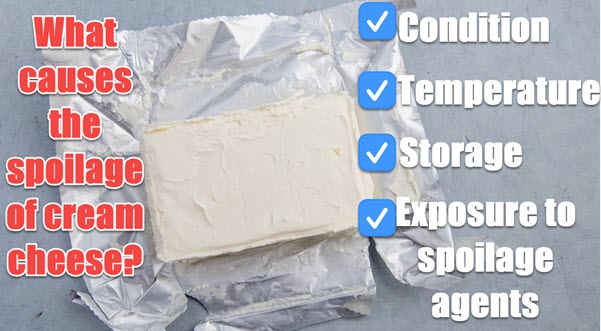
What causes the spoilage of cream cheese?
There’s no exact length of time that a cream cheese will expire. Thus, it is important to understand what affects the shelflife of cream cheese. This will give you an idea of how you should store your cream cheese and therefore, lengthen its shelf life.
- Condition – if you have already opened the packaging of cream cheese, it spoils faster compared to the one that you haven’t opened yet.
- Temperature – cream cheese can easily go bad if you simply store it at room temperature. For example, if you let it sit in your pantry or kitchen, it can go bad as fast as just a few hours. However, if you’re going to store it in the fridge, it can last up to two to four weeks. It will even last for a year if you put it in the freezer. The ideal storage temperature would be below 4 degrees celsius.
- Storage – ideally, you should keep your cream cheese in its original packaging. However, if you have already opened the packaging, try to have a foil wrapped cream cheese. You can do this by putting cream cheese in a bowl and cover it with aluminum foil. You can also put it in an airtight container and then put it inside a ziplock bag for further protection.
- Exposure to spoilage agents – microbial spoilage results in molds, bacterial contamination, and yeast formation. These microscopic organisms can produce harmful waste products that will make your cream cheese go bad.
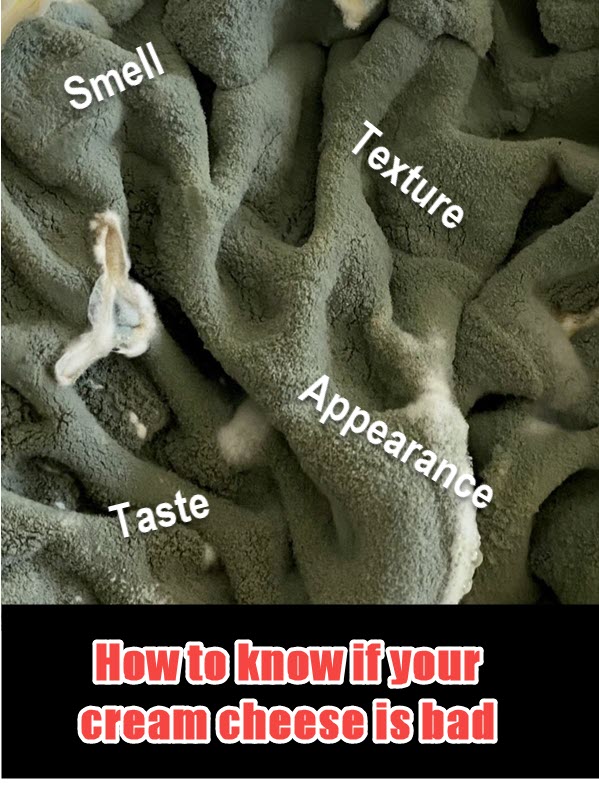
How to know if your cream cheese is bad?
It’s important that you know exactly whether a cream cheese is fit for consumption or not. Here are a few things you need to check:
- Appearance – first thing you need to do is do an ocular inspection. If you are seeing liquid pools on your cream cheese, it is a red flag. It signals that the spoilage process has already begun. Normally, cream cheese is color white. If you see it has some discoloration or you see some yellow or green spots, it has already spoiled.
- Smell – expired cream cheese may have a rotten, pungent, tangy, moldy and sour smell.
- Texture – check out the consistency of your cream cheese. If it becomes lumpy, dry, cracked, or waxy, it’s time to throw it.
- Taste – no need to taste your cream cheese if you have confirmed that it is already spoiled. However, sometimes spoilage isn’t obvious by sight or smell, which is the case for previously frozen cream cheese. In this case, you can try to taste the cream cheese. Spoiled cream cheese would taste sour.
When it comes to food, it is always best to apply the principle, “When in doubt, throw it.” It is better to be safe rather than use suspected spoiled cream cheese and eventually suffer from health problems or make your recipe go bad.

What can happen if you eat bad cream cheese?
Hopefully, you would easily identity an expired cream cheese. However, if you have eaten a bad cream cheese, food poisoning may happen. Some signs and symptoms you may experience would be the following:
- Stomach pain
- Diarrhea
- Nausea
- Vomiting
- Fever
Symptoms may be more severe in people with compromised immune systems. People who have existing medical conditions, those who are advanced in age, and pregnant women may be at greater risk of developing severe symptoms.
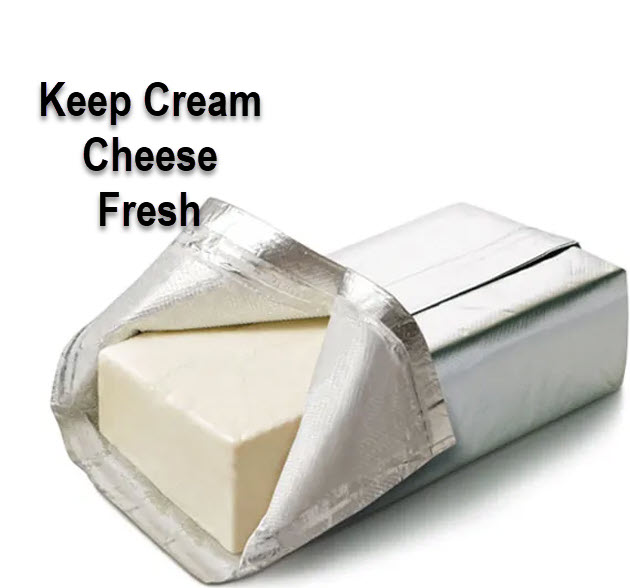
How to keep your cream cheese fresh?
Now, let’s talk about the most important part of our discussion — how can you extend the shelf life of your cream cheese? After all, you can’t stop the inevitable. All food, including cream cheese, will eventually rot.
So, the next best thing you can do is know how to prolong the shelf life of your cream cheese. Here are some tips to remember and follow:
- Buy only when you need it – fresh cream cheese is known to have a short shelf life. From the time it is manufactured, it can only last for a few months. Thus, if possible, only buy cream cheese when you are going to use it within a few weeks.
- Don’t open the package yet – if you’re not going to use the cream cheese, avoid opening the package. If you have opened the package, be sure to consume it within 10 days for the best result.
- Use clean utensils – if you’re not going to use all your cream cheese, use clean utensils each time you use it. This also applies when you use prepared cream cheese frosting. Never use a knife, spoon, or fork that you have already put in your mouth or a utensil you have used in other food. This can easily transfer bacteria to your cream cheese and therefore, have your cream cheese go bad faster.
- Store cream cheese in a cold place – bacteria thrive at room temperature. If you’re going to leave cream cheese out of your fridge, don’t leave it outside for more than two hours. Always put unused cream cheese in your fridge.
- Use the right container – once you have opened your cream cheese and you have some left, be sure to store it in an airtight container. Even if you put the cream cheese in the fridge or freezer but there’s no cover, it will still spoil faster.
- Avoid moisture – moisture is a breeding ground for bacteria, mold, and yeast. So, best to keep your cream cheese container dry at all times.
- Use the freezer carefully – while freezing cream cheese is an option, it can definitely affect the quality of the cream cheese. For one, cream cheeses are sensitive to crystal and ice formation. Thus, the longer you store your cream cheese, the more it will ruin its consistency. Leftover cream cheese can lose its water content and your cream cheese will come out crumbly. Not only that, but the taste would also change. For this reason, as much as possible, only freeze cream cheese for a maximum of two months. When thawing, transfer your cream cheese from the freezer to the fridge and keep it there overnight. Use thawed cream cheese immediately.
Best cream cheese products
If you’re planning to buy cream cheese or have a recipe but you need cream cheese, we have gathered three of the best cream cheese products that you should consider:

- Cream cheese by Cultures for Health – with this product, you can create your own non-GMO, gluten-free and protein-rich cream cheese at home. It’s super easy to use. The product comes with easy-to-follow instructions. Each purchased item comes with 4 individually packaged packets of cream cheese culture. The cream cheese is totally versatile. You can use it in a wide range of recipes.
Buy it now: Amazon
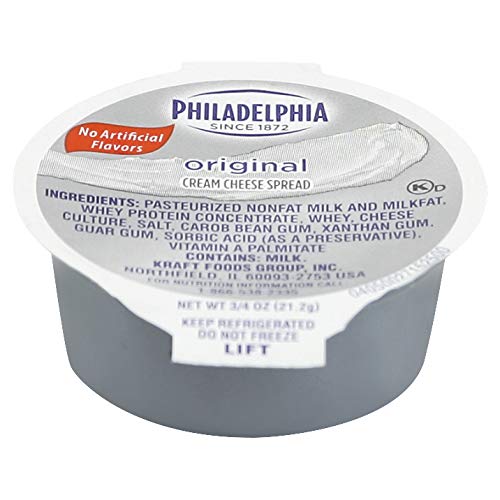
- Cream cheese by Philadelphia – when you say packaged cream cheeses in the US, the first brand that comes up would be Philadelphia. The cream cheese comes in a portion control cup. This means that you can easily store them and use them only for what you need. You can consume the cream cheese as a quick go-to snack or use it in your elaborate baked recipe.
Buy it now: Amazon
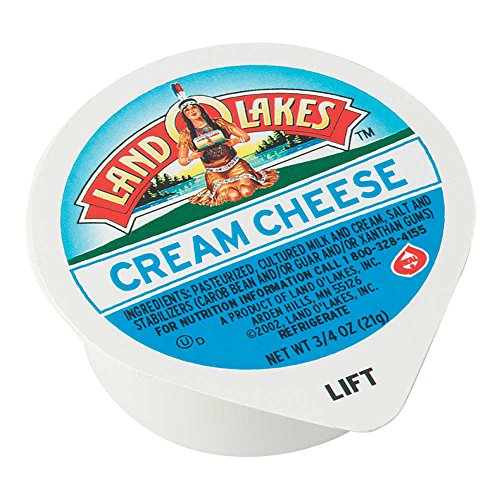
- Cream cheese by Land O Lakes – this is exactly what it says it is, a cream cheese. It is smooth, rich, and creamy with a premium taste. It is a perfect part of your cream cheese frosting, cake icing, and ingredients to your cream cheesecake.
Buy it now: Amazon
Enjoy your cream cheese
So, there you have it. In summary, yes, cream cheese will eventually spoil. It has a short shelf life. You can check its expiration date to know when it is best consumed. However, even after the expiration date, the cream cheese can still be consumed after 2-4 weeks.
Be sure to buy cream cheese when you really need it. Store your cream cheese properly and keep it in the fridge. Check your cream cheese for any sign of spoilage. Finally, be sure to use the best cream cheese products out there for your next delicious recipe.
| Product | Brand | Name | Price |
|---|---|---|---|
 | Cultures For Health | Cultures for Health Cream Cheese Starter Culture | Check Price on Amazon |
 | Philadelphia | Kraft Philadelphia Original Cream Cheese Spread - Cup, 3/4 Ounce | Check Price on Amazon |
 | Land O Lakes | Land O Lakes Cream Cheese, 1 Ounce -- 100 per case. | Check Price on Amazon |
* If you buy through links on our site, we may earn an affiliate commission. For more details, please visit our Privacy policy page.

